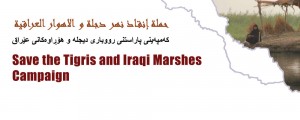
For Immediate Release-Baghdad 26th of September
Baghdad, Iraq—Once the cradle of civilizations and agricultural haven, now Iraq’s land has dried significantly mostly due to man-made causes. For the past 20 years upstream dams in the Euphrates have reduced Iraq’s water income. Now the most important water lifeline in the country, the Tigris River, is being threatened by the construction of Ilisu dam within Turkey’s GAP project that violates international and Iraqi law. The Ilisu dam construction will have catastrophic effects on the lives of Iraqis, who suffer increased drought and loss of lands due to lack of water.
In this context and within the framework of the Iraqi Social Forum happening in Baghdad, the Save the Tigris Campaign is organizing the session: “Water Crisis between Iraq and Neighboring Countries: The Ilisu Dam, Exploring Legal Strategies in Iraq”, on 27 September 2013 in Baghdad. The aim of this session is to discuss legal instruments available inside Iraq and elsewhere to protect Iraq’ s right to water and the equitable shares of the Tigris River with Turkey. International activist together with Iraqi lawyers, are attending the meeting that will analyze legal instruments and propose ways to advocate the Iraqi government to increase their efforts to demand Iraq’s right to water.
While Turkey is one of only a handful of countries that have not ratified the 1997 United Nations Convention on the Law of the Non-Navigational Uses of International Watercourses, this does not mean that Turkey is not bound by those principles set out in the Convention, which reflect general obligations on all states under customary international law. Customary Law related to shared waters is clear in its principle to cause no harm. In that sense, Turkey, in building the Ilisu dam will cause adverse harm to neighboring states and is in violation of customary international law. In addition, Turkey has failed to conduct a transboundary environmental impact assessment that is a threshold duty under international law and did not consult with the communities directly affected by the dam, which is also customary law. With its judgment of 2010 in the Pulp Mills case, the ICJ has recognized that prior assessment of transboundary impacts is a requirement of international law where there is a risk that a proposed industrial activity may have a significant transboundary impact.
In addition, Turkey has engaged in bilateral agreements with Iraq on the use of shared watercourses, like the 1946 Treaty of Friendship and Neighborly Relations states that the government of Turkey agrees to inform Iraq of any projects in order to render such projects to serve the interests of both Turkey and Iraq. Even, if there were no such treaties between the two countries, that does not excuse Turkey from its international obligations.
The session will discuss if it possible to make a case against private companies/Banks or other parties involved in the dam construction/financing. Private companies and banks should be held accountable for their engagement in projects that fail to comply with international law and violate human rights. These European companies, specifically the Austrian company Andritz has continued to provide services and products despite being advised of the human rights and environmental harms resulting from the project, the controversial nature of the dam and despite previous consortiums having been dissolved due to potential human rights violations. Iraqi law might provide for the possibility to proceed legally against any private/public entity that causes harm.
The Ilisu dam case has not been resolved, and it is Iraq’s responsibility to deal with it wisely, as the consequences of not doing so would mean giving Turkey a free ticket with respect to the construction of other dams on the Tigris River, that could result in a disaster to Iraq’s economic development.
Save the Tigris Campaign is a regional advocacy campaign with partners in Turkey, Iraq, and internationally that works to raise awareness about the economic and environmental impacts of the Ilisu dam on Turkey and Iraq.
Save the Tigris and Iraqi Marshes Coalition:
1. Iraqi People Campaign to Save the Tigris, Iraq
2. Civil Development Organization, Iraq
3. Iraqi Civil Society Solidarity Initiative, Iraq
4. Initiative to Keep Hasankeyf Alive, Turkey
5. Corner House, UK
6. Counter Current, Germany
7. Un Ponte Per, Italy
For more information Contact:
Ismaeel Dawood:
Iraqi Civil Society Solidarity Initiative
Ercan Ayboga:
e.ayboga@gmx.net
Initiative to Keep Hasankeyf Alive
Johanna L. Rivera:
johanna.rivera56@gmail.com
Save the Tigris Campaign
###

No comments:
Post a Comment